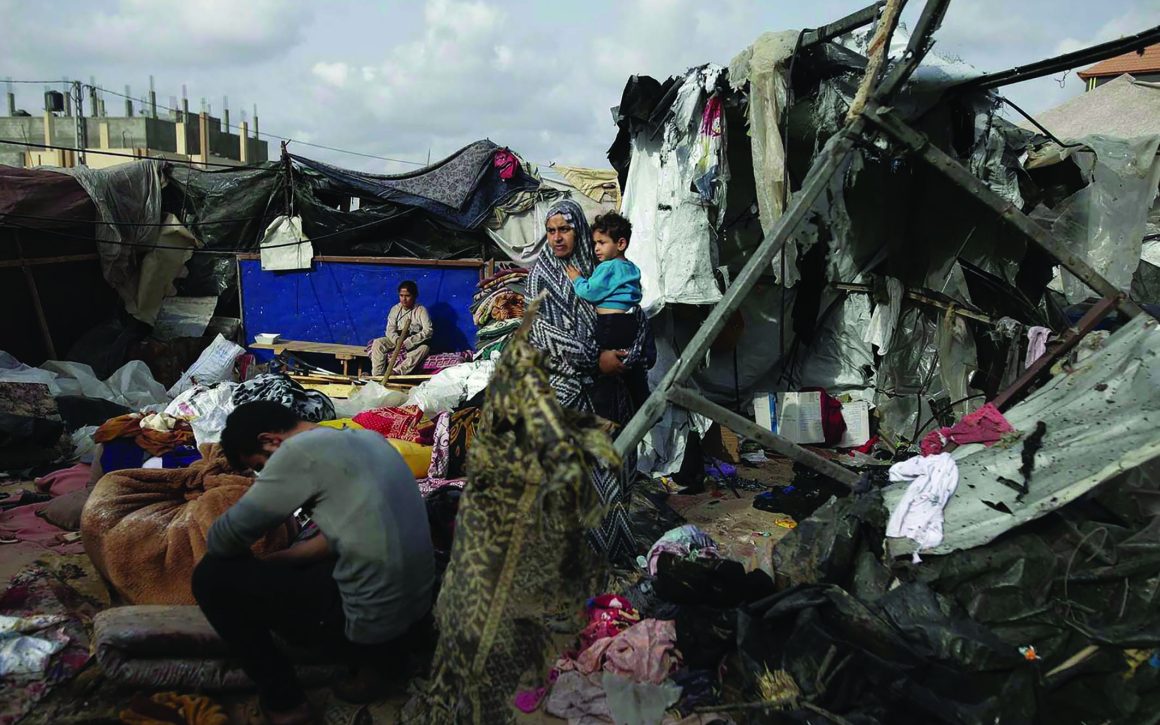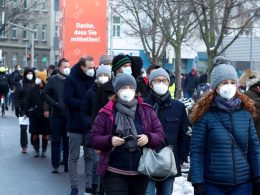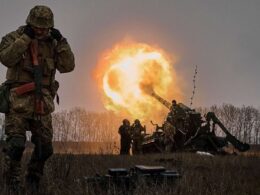By Kevin McLoughlin
With the Palestinian people facing a new offensive, the global solidarity movement needs to step up to try to end this nightmare. Palestine, but Gaza in particular, has assumed a central place in global politics. This livestreamed genocide is the prime example of imperialist barbarity today. However, it is also fostering solidarity and a new radical and internationalist consciousness.
The situation in Gaza could not be more urgent. Gaza is three times smaller than Hiroshima, yet in the last two years has been hit with the equivalent of eight of the atomic bombs that were dropped on that city in 1945. Children are dying of starvation in a famine deliberately engineered by Israel. Toxic and radioactive substances pervade, causing severe illnesses in already malnourished people. In Gaza City, the IDF is destroying the remaining high-rise apartment buildings and seeking to displace its one million inhabitants. Meanwhile in the West Bank, the campaign of murder, intimidation and land theft by settlers – working hand in glove with the military and government – is escalating rapidly.
Netanyahu threatens that this is ‘just the beginning’. Israeli politicians talk of taking out the next generations of Palestinians. Indeed, it’s increasingly clear that the ethnic cleansing of the Gaza strip is the goal of his regime and these plans have the open backing of the Trump administration.
Propaganda and repression
Despite the unprecedented propaganda, people know the truth about this genocide and will not forget who is responsible. The Zionist State, successive US governments, and other Western imperial powers will be put in the dock for their direct participation in, or support for, the genocide, and most governments will be condemned for their lack of decisive action to stop it – not least the rotten regimes in the Arab states.
Cloaking themselves in victimhood, Zionism has always cynically exploited people’s profound horror at the Holocaust to deflect criticism of their brutal oppression, but this is wearing increasingly thin, even for those inclined to sympathise with Israel. The 2016 IHRA definition of anti-Semitism, which equates anti-Semitism with criticism of Zionism, is a similar tactic. Many states are using precisely this to attack the right to protest, in words or in deeds, against Israel’s genocide in Gaza. The genocide is in that sense also a lever for a generalised attack on democratic rights, most obviously in the US, Britain, Germany and in the Middle East and North Africa itself.
Notwithstanding this repression and propaganda, however, a recent poll in the United States found that over half of voters believe Israel is carrying out a genocide. These figures stand at 77% amongst Democratic voters. Significantly, there is a growing shift taking place within the American Jewish community, particularly among young American Jews, where there is growing opposition to Israel’s actions.
Fear of this trend, as well as the fact that Trump is dragging the US and other capitalist countries in an autocratic direction, explains the viciousness of the clampdowns. Barely constrained, far-right forces in many countries are increasingly targeting anyone who resists. While there can be an uneasy tension between some state forces and these new far-right actors, people are likely to face attacks from both. The assassination of Charlie Kirk gives a major boost to this dynamic.
Project Esther, rolled out by the far-right Heritage Foundation last October, is helping to coordinate a drive in the US and elsewhere against the growing awareness and support for the Palestinian cause. It advocates that people or groups that challenge Israel’s actions face censorship, intimidation and the full force of the law. Trump quickly signed an executive order cracking down on pro-Palestinian advocacy. The change is being felt particularly on campuses. Already many US states passed laws where individuals or companies who boycott or refuse to engage with Israel can be penalised. In many countries, displaying solidarity with the Palestinian people undergoing genocide can mean arrest and being classed as supporting terrorism.
Clearly repression has an impact, but as with their propaganda, ultimately it will not work and then it can actually act as a multiplier – dramatically exposing how deeply undemocratic, exploitative and rotten the different capitalist states that engage such tactics really are.
Historic movement
The global solidarity movement for Palestine is already unparalleled in world history. And it’s not only the scale of the protests (43,000 in Europe alone), but what people are witnessing – the unimaginable horror, hypocrisy and cynicism – and how deeply this is changing the political outlook of millions across the planet. The basis is being laid for explosions of anger and discontent. In this way the genocide and the struggle for Palestinian liberation is directly changing politics many countries, and laying the groundwork for new political movements.
Palestine has emerged as a seminal issue over many years. In trying to understand the unequal, exploitative and oppressive world, growing layers looked to the role of colonialism and imperialism, sharpening the awareness and anger at such forces and deepening solidarity for the victims. In this context, the failure of the Oslo Accords and intensified Israeli oppression led to the Second Intifada, 2000-2005, which was ultimately repressed. Later in 2005, the global BDS movement was founded and spread.
The brutality of Israel’s 2008, 2014 and 2021 bombardments of Gaza deepened awareness and the sympathy for the Palestinian cause, up to the point that when the attack happened on 7 October 2023, that without any disrespect to the victims, people’s overwhelming focus was on the slaughter that Israel was about to unleash again after decades-long torture of the Palestinian people. The global solidarity movement mushroomed.
The situation in the Middle East and North Africa is critical. Here, what is happening to their Palestinian siblings is a central issue. The people in these countries have experienced the highs of the revolutions in 2011 across the region, uprisings in 2019 in Algeria, Sudan, Lebanon, and Iraq, and in 2022 with the ‘Women, Life, Freedom’ revolt in Iran. Right now they may be subdued, flowing from setbacks and defeats, but none of the issues that sparked those revolts are resolved.
There is huge resentment across this region at the impotence of the ruling elites in the face of genocide in Palestine. While a reported 10% of adults here protested the genocide in 2024, this has not yet resulted in consistent mass mobilisations or new revolts against these regimes (who in general accept the diktats of the US, and were open to a normalisation of relations with Israel before the genocide – an massive betrayal of the Palestinian cause). This is due to serious repression, and maneuvering (with some regimes posing as outraged but in order to control the discontent), as well as the continuing effects of the recent defeats of movements.
Global strike for Gaza
Gaza is now a hellscape, and conditions in the West Bank are increasingly horrendous. More and more people understand what’s going on. There is a huge support for Palestine, and hatred for its oppressors. The situation in the neighbouring countries is unstable and the regimes fear that opposition to the genocide is a potential ‘Gateway to Dissent’ on all issues, and new mass movements that can threaten their rule. If such movements were to develop and spread, it could create huge pressure on the regimes to act, but also on the US, which is a key player but increasingly divided.
The global movement, but the masses in Arab countries in particular, are an essential part in the struggle against genocide and for Palestinian liberation. We must all redouble our efforts to bring the global movement onto another level. Of course continue with the protests and demonstrations, and the targeting of Israel’s genocide machine. But such is the breadth of concern that the idea of strike action of all workers – A Global Strike for Gaza – should be popularised, using that the second anniversary is fast approaching. There are no guarantees, but it is crucial to continue to fight, and there are more than a few examples from the past of a risen people bringing hope and betterment out of war and barbarity.
The struggle for an end the genocide, occupation, apartheid and crucially the existence of a Zionist State is one that is inherently bound up with the necessity to rid humanity of the rule of capitalism and imperialism, which the state is part of. It means fighting for a socialist society in which there can be genuine political and economic freedom for all, and oppression for none.












